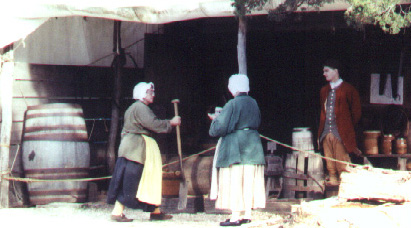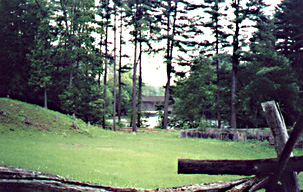

Carolyn Merchant
Major Problems in American Environmental History
(ISBN 0-669-24993-9)
start | question | authors | context | definition | content | periods | related ideas | conflicting imagery | artists | dialectic | conclusion | next


How do we describe significant links that knit the lives of the people to the contours of their terrain?
Merchant | Worster | Cronin | Reisner | Jackson | Siry | Leopold | Diamond | Williams | Austin | Mumford | Marx
Ecology and history give an Earth's eye view of our past.
loss of biological diversity, the bison.
race and gender discrimination.
climate chaos, sea level rise, air and water contamination.
Reversing historical time-line:
Conservation emerges
Urban and industrial challenges
Frontier exploration to exploitation
Agricultural expansion
Amerindian resistance
Colonial Settlements
- Spanish
- Catalan
- Portuguese
- French
- English
- Dutch
- Russian
- Swedish
- Danish
- Scots-Irish
- Basque
- Germanic
- Pormanteau
- Creole
start | question | authors | context | definition | content | periods | related ideas | conflicting imagery | artists | dialectic | conclusion | next
Aboriginal conditions lead to a debate:
Dialectically speaking it turns into arguments for three argument-based bodies of knowledge
- Thesis: Overkill -- native populations, hunting and farming practices exterminated big herd animals.
- Antithesis: Over chill -- native herd animals could not adjust to rapid climate changes and died out.
- Synthesis: "Noble savage" and the humble hunters or precocious planters
- Natives saw the universe as a as sacred manifestation of the animal.
- Subsistence living demands a certain recognition of long-term limits
- seven generations
- the burning of grasslands and forests improved game and gathering
- original conservationists
- infanticide and euthanasia as practices to stabilize populations
- alleged cannibalism.
Le longe duree, or the long duration --long term perspective (Fernand Braudel's phrase)
the five epochs of landuse change
- Ice Ages end
- Amerindian occupation
- Dispossession of the Indians
- Industrialization
- urban agglomeration
start | question | authors | context | definition | content | periods | related ideas | conflicting imagery | artists | dialectic | conclusion | next
Merchant's, Earth's eye-view of historical stasis and change.
a. long term, millions of years or more
b. short term is 10,000 years or less
b.1. dates
b.2. time line
periods character landuse conditions loss of large animals spreading grasslands burning of areas hunting and agriculture Dispossession of the Indians
spread of Euro-livestock & crops three field market agrarianism water, wind and mineral fuels commercial improvements, air and water pollution dense core and suburban periphery impervious surfaces, heat, smog The scale of these landscape changes.
Historical
"How did people's attitudes change toward nature and their mental constructions of nature change over time?"
p. 1
Eras we focus on
Preindustrial, prior to 1700.
Industrial, 1690-1890
Post industrial or hyper industrial, 1890-now
Terms to know:
Culture, as opposed to ethnic identity, the collective inheritance in customs, language, beliefs and behavior inherited form the past and passed on in pieces from one generation to another until the legacy becomes almost a "second nature" to any society we encounter. A means of examining, explaining, analyzing and determining the meaning of differences between human populations with respect to a set of predefined categories such as "means of subsistence," beliefs and institutions, dominant cults, class interaction, styles of materials, or intangible, but consistent qualities over time. see page on "Culture."
ideology, means the faith in a political and economic creed that sanctifies a set of behaviors associated with those prevailing ideas. see page on ideology.
values, are another way to discuss -- with some distance-- the moral imagination and ethical constraints each culture employs to constrain the behavior and habits of its members, social norms or acceptable means to function effectively in any group. see pages on values, and value.
determinism, the belief that the forces of nature, the economy, human thought, or heritage dictate human conditions.
nationalism, a form of cultural determinism that says ethnicity, or the dominant narrative of the master language shapes history. See this page.
dynamism, a discernable fluctuation around a norm or extreme. "There are benchmarks "for comparing one kind of change with another." p. 18. See feedback.
prediction, the ability of a model in science or behavioral science to explain an outcome before it happens.
collapse, what happens in when natural conditions when certain basic laws of physical and life sciences are violated by consumption of resources or population growth and migration from one place to another. See this page.
modes, the means or ways, or habitual patterns of functioning that relate to the process by which something comes about.
models, a sort of short hand description, sometimes mathematical, or graphical, or linguistic to make sense out of a huge amount of frequently variable information, diverse data, or competing arguments to explain events. See this 1st of nine pages on models.
terrain, literally from the Latin for earth [terra], soil, the dirt under out feet. figuratively the contours of the geographical setting comprised by land. air, water that create a field or stage for actions, hence the focus of attention for a field of inquiry.
start | question | authors | context | definition | content | periods | related ideas | conflicting imagery | artists | dialectic | conclusion | next
Authors:
Donald Worster
Any material culture is the product of human labor when the means of production dictates prevailing habits, justifications, and institutional structures to promote the dominant means of accessing, using and reorganizing water, energy, air and land sources into commodities derived from resources.
"neither nature nor culture is static." Thus history is a form of probable stories about what was to give us some hope of imagining and articulating that vision of a viable "hopeful," and prospering future because ". . . all of us change the world around us." pp. 18-20
"ideas drawn from feminist theory suggest the usefulness of another level of analysis –reproduction– that has both biological and social aspects."
"the numbers that can be sustained are related to the modes of production."
"nutritional factors and tribally acceptable customs dictated the number of infants that survived to adulthood to reproduce..."
"Industrialization resulted in fewer births per female.".
"People" are wedded to the land for food, fuel, fiber and fodder p. 25.
"People pass on skills and behavioral norms to the next generation of producers."
"A gender perspective. . . both offers a more balanced and complete picture of past human interactions with the nature (ecology) and advances its theoretical framework…." and "add to the complexity of history. They help us to envision the possibility of a socially just world that could be a better place in which to live."
p. 25.
Art as a problem | question | authors | context | definition | content | periods
Worster's challenge | related ideas | conflicting imagery | artists | dialectic | conclusion | next
| Siry | Coastal transformation of ecological functions in geographical settings over time is due to using technology commensurate with the knowledge, skill, and fuel sources of the people and the places in question. | Beyond social cooperation, economic competition and structural barriers repeatedly, directly (intentionally) and indirectly, (inadvertently) reshaped the land's ecology by influencing, rewarding and penalizing human actions. |
|---|---|---|
| Worster | "modes of production," or means of subsistence | "perceptions, ideology, and values." "...to lord over nature" p. 8. |
| Diamond | Montana is a case study of collapsing social institutions --like Easter Island before it it-- we are living beyond the capacity of the natural resources to maintain settlements in a sustained yield system of codependency. | Geography my not determine settlement patterns but biology and geography dictate certain overriding constraints to which culture adapts, or languishes for want of revitalizing the landscape and regenerating the geography to sustain continued settlement. |
| Cronin | inherent tension between history vs. environmentalism | "The natural context of all …history" p. 17. "neither nature nor culture is static." p, 18. |
| Merchant | "The psychic wound of racism... resulted in wounds in the land." p. 20. | race, class, gender, influence how agrarian -- industrial -- capitalistic stories are told and interpreted. pp. 21-24. |
End of Overview
start | question | authors | context | definition | content | periods | related ideas | conflicting imagery | artists | dialectic | conclusion
Merchant | Worster | Cronin | Reisner | Jackson | Siry | Leopold | Williams | Austin | Mumford | Marx